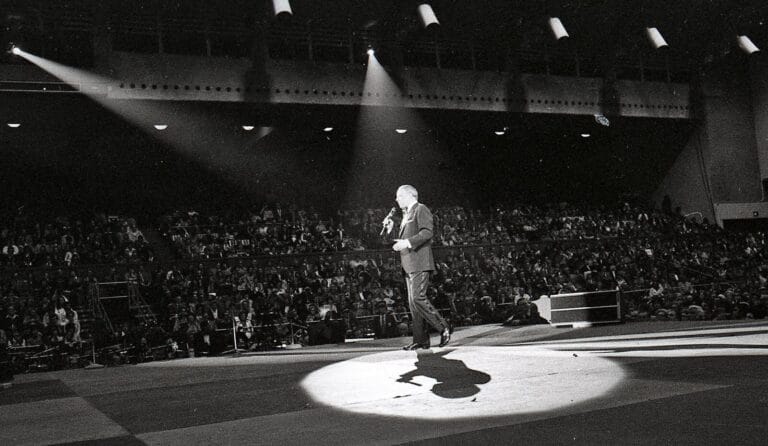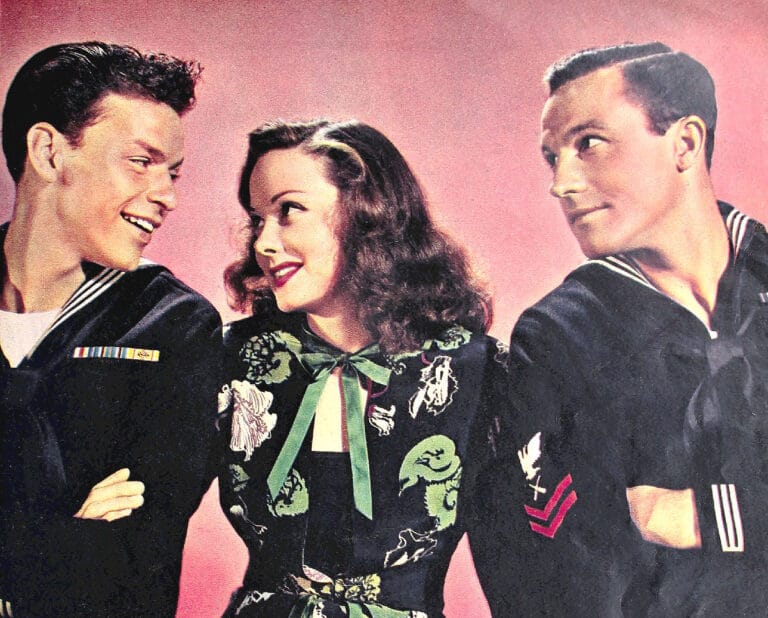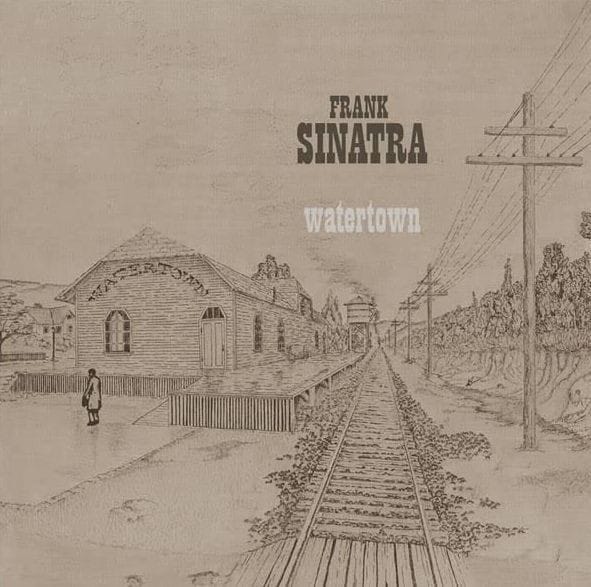
FRANK SINATRA BIOGRAPHY (1942-1944)
By Mahnuel Muñoz
On December 30, 1942, Frank appeared at the Paramount Theater in New York as a guest artist in a concert starring Benny Goodman. When Frank came on stage, the theater erupted in a thunderous applause that had never been witnessed by anyone present. The unusual success led the theater to extend the artist’s contract up to eight weeks, causing scenes of adolescent hysteria and huge crowds outside the venue at each performance. His admirers will be called “bobbysoxers” because of the characteristic white socks they wore.
On February 4, 1943, the film “Reveille With Beverly” was released, the first in which Sinatra appeared alone. It’s just a cameo in which he sings “Night And Day.” That same month Frank signed a record deal with Columbia Records that coincided with a musicians’ strike, so Sinatra’s first release with his new company was a reissue of the 1939 recording of “All Or Nothing At All” featuring The Harry James Orchestra. It was a masterstroke: the album became the first Voz album to reach one million copies sold. The first recordings for Columbia took place on June 7, 1943 and he made them accompanied only by the voice choir The Bobby Tucker Singers, and constitute a beautiful rarity unparalleled in Sinatra’s discography.
On August 14, 1943, Sinatra made history again by giving a successful concert at the Hollywood Bowl, a venue until then reserved for cultured music. The ten thousand people in the stalls bid farewell to the singer with a standing ovation. A month later, the singer signed a seven-year film contract with RKO. His first film with the studio was “Higher And Higher”, in which he plays himself and sings five songs.
On January 10, 1944, at the Margaret Hague Hospital in Jersey City, Franklin Wayne Emmanuel, better known as Frank Junior, Sinatra’s second son, was born. His father is in Hollywood, thousands of miles away, performing on a live radio show. His acting ability is amazing and he deeply excites the audience present at his shows. During a benefit concert, his version of “Ol’Man River” brought Louis B. Mayer, president of the MGM film studios, to tears. After the show, the magnate ordered his signing by the company with a contract of one and a half million dollars. Columnist Walter Winchell wrote that at the time Sinatra was the highest-paid entertainer in the world.
But the road to the top was punctuated by unhealthy criticism from some media outlets that made light of the fact that Sinatra did not enlist in the army, ignoring the fact that the singer tried to join the war effort but was rejected for having a perforated eardrum. . One of the most toxic voices was that of Lee Mortimer, columnist for the “New York Daily Mirror”, who began a tireless campaign of smear against all personal and professional facets of Sinatra. Mortimer’s pettiness fueled Frank’s growing disdain for the tabloid press, which took shape in numerous physical and dialectical altercations that inevitably began to change the public’s perception of the young Sinatra.
Looking for a place to relax with his family and be closer to Hollywood, Frank moves from New York to the San Fernando Valley in California, to a Mediterranean-style house that had been owned by actress Mary Astor. Frank enjoyed trout fishing, swimming, and playing cards with arranger Axel Stordahl, composer Sammy Cahn, and screenwriter Don McGuire.
In June 1944 Frank began filming the film “Anchors Aweigh” with his partner, actor and dancer Gene Kelly. In the film Sinatra not only sings, he also dances, well directed by Kelly. Meanwhile, his latest feature film with RKO, “Step Lively,” starring alongside Gloria DeHaven, hits theaters.
On October 11, 1944, Columbus Day in the United States, one of the most emblematic events of Frank Sinatra’s artistic career took place. The marquee of the Paramount Theater in New York was covered with a poster the equivalent of two stories high with Sinatra’s face as the main protagonist. An evening was announced in which the film “Our Hearts Were Young And Gay” would be screened, followed by performances by comedians, dancers and musicians, with the recital of The Voice as a brilliant culmination.
Sinatra fans, who at that time were numerous, began to flock to the theater box office at four-thirty in the morning. They were difficult times to understand today; Frank gave FIVE concerts a day at the Paramount Theater (and he did so for three weeks) and the first of them took place at twelve in the morning. When the doors of the venue opened, there was a full house. After the concert, the spectators refused to leave their seats to enjoy the show again. On the street, a line of ten thousand people lost patience waiting for their turn, and around twenty thousand others wandered through Times Square to find out what was causing such a wait, with the inevitable circulatory collapse.
The law enforcement forces had to make an impressive display to take control of the situation. The figures and effects of the “Sinatramania” suggest a social revolt: almost 600 police officers and 200 detectives mobilized, destruction to the theater and the windows of the neighboring stores, and most importantly: an outrageous statement from the Department of Education. : “We cannot tolerate young women making a public display of how they lose control of their emotions”
Between November and December 1944, after the end of the musicians’ strike, Frank returned to recording songs backed by a sumptuous orchestra. In five sessions, almost twenty classics are recorded, including “Saturday Night Is The Loneliest Night Of The Week”, “Ol’Man River”, “Embraceable You” and “Nancy”.
Access the Complete Biography of Frank Sinatra in the following link of Sinatra Radio 24h https://sinatraradio24h.com/category/biography/
We remind you that you can also listen to Sinatra Radio 24 hours on your mobile phone by downloading our free applications for Android in the Play Store https://play.google.com/store/apps/details?id=sinatra.radio24h








